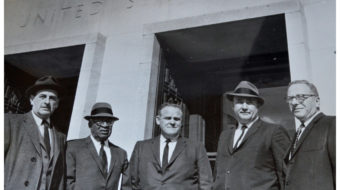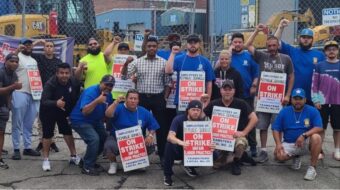WASHINGTON – The New Year was a time of revelry for the corporate rich as government reports confirmed a surge in profits and productivity in the final quarter of 2003. George W. Bush trumpeted the news as proof that his trillions in tax cuts for the wealthy has pulled the nation out of recession.
But as syndicated columnist Paul Krugman observed, “the economic recovery is an exclusive party and most people weren’t invited.”
John Dodds, director of the Philadelphia Unemployment Project (PUP), blasted Congress for going on their Christmas-New Year holiday without approving the Temporary Extended Unemployment Compensation (TEUC) program that provides federal jobless benefits for the long-term unemployed. “It means that 80,000 to 90,000 workers are running out of jobless benefits each week,” Dodds said. “We staged a demonstration on Capitol Hill Dec. 9 to demand they extend it. But they refused.”
In Philadelphia, he said, the jobless rate is about 7.8 percent. “It’s really terrible,” he said. “We have thousands of people who have run out of unemployment benefits, can’t find work and are facing eviction or foreclosure on their homes.” The Bureau of Labor Statistics unemployment report for November was virtually unchanged from a month earlier with overall joblessness at 5.9 percent. Bush crowed that 57,000 more jobs were created. But for African Americans, the jobless rate was 10.2 percent, for Latinos, 7.4 percent and for teenagers, 15.5 percent.
Dodds pointed out that while there is a “cyclical upturn” there is structural unemployment that threatens to grow far worse in 2004. IBM has announced plans to shift thousands of white-collar jobs to India. In November, Verizon announced it has shrunk its workforce by 21,000 in job buyouts. AT&T plans to eliminate 3,000 jobs. And at least 25 percent of the nation’s 150,000 steelworkers are slated to be terminated. A $200 billion combined deficit in the 50 states is already forcing layoffs of thousands of public employees. These are permanent job terminations, not layoffs.
PUP has joined with labor and community groups to fight the evictions of the unemployed, Dodds said. PUP is also demanding that Congress act immediately to approve TEUC extension when it reconvenes in mid-January.
“It’s going to be very hard to get this majority-Republican Congress to approve another extension, even though long term unemployment is at the highest level in 20 years. It is really a very bad time to eliminate this program,” Dodd said.
It is crucial for Howard Dean and other Democratic presidential candidates to expose the Bush economic policy as a gravy train for big business and bare bones for working people, Dodd said. “If Dean can present an alternative program that creates jobs and higher income, it will resonate,” he added.
AFL-CIO President John Sweeney said, “It is appalling that 90,000 workers a week will run out of state unemployment benefits without any safety net from Congress and the Bush administration. The administration is clearly in denial about the fact that those standing in the unemployment lines are not feeling any signs of economic recovery.”
Job growth is far below the 150,000 a month needed to keep up with the expanding workforce, Sweeney said, let alone restore the 2.6 million jobs lost since Bush took office. Productivity and profits are surging because employers are squeezing more production from fewer workers. It means a sharp rise in the rate of wage exploitation.
The year ended with 8.7 million unemployed by official count. Add to that 4.9 million part-time workers who want full-time jobs plus 1.5 million who have given up the search for nonexistent jobs, and more than 15 million are actually unemployed or underemployed, or 9.7 percent of the workforce.
The Economic Policy Institute “Jobs Picture” bulletin last month warned that on a quarterly basis, wages grew last year less than 1 percent, “well below inflation.” The report added, “Thus, despite high productivity and profits, many workers are losing ground in the current labor market.” The share of those out of work for six months or more grew to 23.7 percent, the highest level since 1983. And the average number of weeks spent job-hunting rose to 20.1.
Krugman asks, “So if jobs are scarce and wages are flat, who’s benefiting from the economy’s expansion? The direct gains are going largely to corporate profits which rose at an annual rate of more than 40 percent in the third quarter.”
No wonder the wealthy elite have poured $120 million into Bush-Cheney campaign coffers to buy them a second term next November.
The author can be reached at greenerpastures21212@yahoo.com.









